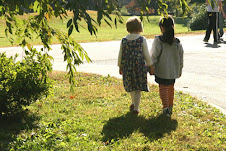Here's a seed for next Monday's walk-and-talk about one of the school's founding beliefs: That effective learning methods include play, conversation, and being with kids of all ages.
I had a conversation this weekend with a mathematician. I asked him how he learned best. He said that he learned best through conversation. Conversation! A mathematician!
Sudbury-model students would not be surprised by this answer. A tremendous amount of their learning is through conversation. Conversation requires you to clarify and articulate your beliefs, experiences and observations, and it requires you to find a common understanding with others, who have different backgrounds and beliefs. This is true whether you're talking about how your weekend was, what your favourite music is, or anything else that comes up. Kids with freedom naturally talk about what is most important to them, and they are a better judge than anyone else of what that should be.
It's a common belief that the best way to learn something is to teach it. Schools should allow this, not block it by dividing people by age and insisting that they not talk. Kids love learning from other kids, informally through conversation, or even formally, by asking for help. And kids love using their new knowledge to help others. Learning, understanding, and teaching go hand in hand - unless the hands are made to let go.
Kids love to play. Play is fully engaging. Kids create new worlds, investigate new concepts, explore personal limits. To adults it might just look like playing, but to kids it's fully engaging with the world as they know it, an ever-expanding world.
Our world is changing quickly. The best preparation to be an adult in this world is to spend your childhood exploring, investigating, playing fully with the world as you know it. Kids are the best judge of what they are ready to engage with, and how to engage with it. They have a drive to play at the edge, to expand themselves, to grow into the world.
Play, conversation and age-mixing: Invaluable attributes of an effective school.
Subscribe to:
Post Comments (Atom)

No comments:
Post a Comment